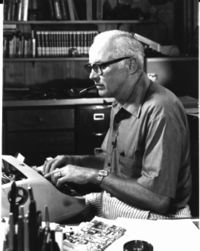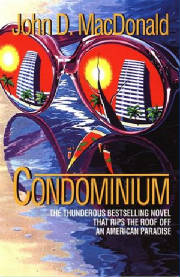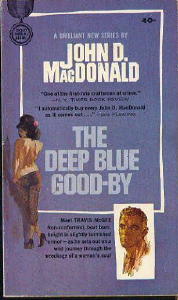FBR Feature: John D. MacDonald
Memories of MacDonald, Memories of MacDonald's McGee
By Keith Ferrell
By Keith Ferrell
Time was, a couple of decades ago, John D. MacDonald ranked high among the most popular writers in America, and his Travis McGee among the most beloved of fictional characters.
Times change.
McGee continues to have a devoted following—but evidently a shrinking one: the Web has fewer sites in McGee and his creator's honor than you might expect, and many of those seem moribund if not abandoned.
MacDonald, and particularly his body of work beyond the boundaries of McGee-land, is largely out-of-print and all-but forgotten except by other writers. Stephen King, Dean Koontz, Harlan Ellison and others have acknowledged large debts to the master's non-McGee works; reprints of the McGee novels carry a knowing and respectful introduction by Carl Hiaasen.
McGee may well be all that the average reader knows of MacDonald.
Which is in some ways a shame. MacDonald's voice was one of the most distinctive to emerge from commercial fiction—his specialty was suspense (not mystery) although he wrote a fair amount of science fiction early in his career. (He wrote, actually, more than a fair amount of everything, averaging 200,000 words a month as he began his post World War II break into the pulp magazines.)
Times change.
McGee continues to have a devoted following—but evidently a shrinking one: the Web has fewer sites in McGee and his creator's honor than you might expect, and many of those seem moribund if not abandoned.
MacDonald, and particularly his body of work beyond the boundaries of McGee-land, is largely out-of-print and all-but forgotten except by other writers. Stephen King, Dean Koontz, Harlan Ellison and others have acknowledged large debts to the master's non-McGee works; reprints of the McGee novels carry a knowing and respectful introduction by Carl Hiaasen.
McGee may well be all that the average reader knows of MacDonald.
Which is in some ways a shame. MacDonald's voice was one of the most distinctive to emerge from commercial fiction—his specialty was suspense (not mystery) although he wrote a fair amount of science fiction early in his career. (He wrote, actually, more than a fair amount of everything, averaging 200,000 words a month as he began his post World War II break into the pulp magazines.)
|
It was a voice both sharp and supple, precise and mannered, distinctive yet distant, a terrific vehicle for propelling plot while allowing MacDonald a degree of social commentary and criticism uncommon in paperback suspense fiction of the tranquil Fifties, and still rare during the volatile Sixties when McGee came to paperback life.
This, from 1962's A Flash of Green, one of the best of MacDonald's non-McGee novels, gives a taste: The offices of Bliss Construction were in a small one-story building in a commercial area on Bay Highway, south of the city, just over the city line, about a mile and a half north of the light where Mangrove Road turned toward Grassy Key. Behind the office structure, and enclosed by hurricane fence, were the storage buildings, a workshop and the vehicle park. His transit-mix cement plant and his hot-mix asphalt plant were in a heavy-industry zone north of Palm City. Though Elmo had expanded with startling speed throughout the fifties, he had the curious ability to give each new venture the flavor of having been his from the very beginning. His expansion no longer seemed as brash and reckless as it had been. He had adjusted so readily to being one of the city's most influential businessmen that it was easy to believe he always had been. The tales of his early wildnesses were told with the same fond nostalgia usually reserved for incidents of a prior century. Jimmy Wang had wondered why this could be true, and had finally realized that Elmo would have been unable to achieve this quality of acceptance in a more static community. Palm County growth had been dramatic. Total county population had been a little over twenty-five thousand when Elmo had been swinging a brush hook on a county road gang. Now it was over seventy-five thousand, and most of the newcomers had arrived after Bliss Construction was an established firm. To them, the Elmo Bliss of the wild years had the quality of myth. |
Over the course of a career that lasted 40 years and produced 66 novels and more than 500 short stories, MacDonald's voice remained remarkably (and in some ways unfortunately) consistent: clean prose that rarely employed metaphor or other literary effect; authoritative, particularly on the careers and industries he moved his characters through (MacDonald had a Wharton MBA when MBAs were rare); observant, especially of small human tics and larger human despoilings of the natural world;
From the opening pages of The Long Lavender Look (1970):
From the opening pages of The Long Lavender Look (1970):
So I was whipping along, but alert for wildlife. I hate to kill a raccoon. Urban Florida is using the rabies myth to justify wiping them out, with guns, traps, and poison. The average raccoon is more affable, intelligent, and tidy than the average meathead who wants them eliminated, and is usually a lot better looking.
It is both sad and ironic that the areas where the raccoon are obliterated are soon overrun with snakes.
MacDonald was also almost preternaturally perceptive when it came to describing the cruelties, violent and often sexual, humans are capable of. His characters' capacity for often perverse cruelty, and MacDonald's capacity for capturing it on the page—remains remarkable, perhaps most so because of, again, the distanced and distinctive and above all authoritative John D. MacDonald "voice" that gave some of his most lurid scenes the flavor of anthropological reports on the sadisms and nastinesses humans can conceive of and inflict upon each other.
|
On the nicer side of the human equation, MacDonald did less well. His "decent" characters are rarely wholly convincing; his portraits of successful marriages are most often put together from stock slick magazine-fiction elements; his female characters are almost universally unconvincing and equally universally portrayed with, to borrow a word from the Sixties and Seventies, chauvinism to a level that occasionally verges on self-parody. His attempts throughout his career to create ethnic characters and deal with racial issues are little short of grotesque, and not short at all of being rich-white-liberal-condescending.
All of which, I think, has as much to do with MacDonald's authoritative stance as with his limitations as an artist (he had few limitations as a craftsman, which is not necessarily a lesser thing, but is also not the same thing.) MacDonald's fictional voice was, like Robert Heinlein's in science fiction, John O'Hara's on a higher literary level, and, on a far higher literary level, Ernest Hemingway's over the last couple of decades of his life, the voice of the "author who knows everything." This passage from Murder in the Wind (1956) puts on display MacDonald's perceptions, precisions, pomposities and prejudices all at once: Hilda, the eight hurricane of the season, missed Key West. But tons of rain fell on that peculiarly disappointing city at the terminus of a magical highway. |
THE "McGEE SPECIAL" MARTINI
"...a familiar face was working the quiet and elegant bar, and he remembered The Drink, and seemed so pleased with himself in remembering, that we each had one, sitting and watching the deftness with silent and respectful attention. Two ample old-fashioned glasses, side by side, filled to the two thirds line with cracked ice. A big, unmeasured slosh of dry sherry into each glass. Then swiftly, the strainer placed across the top of one and then the other, as with a delicate snap of the wrist he dumped the sherry down the drain. Then fill to the ice level with Plymouth gin, rub the lemon peel around the inside of the rim, pinch some little floating beads of citrus oil on the surface of the drink, throw away the peel, present with small tidy bow and flourish to the folk. 'Two McGees,' said he." Pale Gray for Guilt |
(Homophobia is a pretty constant MacDonald tic. But language changes with times, too, and the evolution of language may have exacted some revenge on MacDonald. The opening page of Area of Suspicion—1954, revised 1961—contains this: "My bachelor cottage is a few hundred yards from their big house at Indian Rocks Beach. It is a good little party house, and when I bought it four years ago, I wanted the gay life—and got it." That life, like Key West, is something completely different today, and it would be nice—or maybe not—to know what MacDonald thought of either development.)
In the few interviews MacDonald gave he gave as well a pretty clear indication that he would not be questioned or disagreed with; in his letters to Dan Rowan of Laugh-In fame, collected in A Friendship, he comes across often as Moses on the mountain issuing the Word of the Law about everything, particularly morals, scruples, money, sex.
There is little room for ambiguity or nuance in such a stance, and rarely room for acknowledging uncertainty or, heaven forbid, error.
And why, finally, should there be? A writers' works are—or should be—the product of an individual mind, and MacDonald was more individual than most. The cavils I've caviled here have as much to do with explaining (for or to myself, anyway) why much of MacDonald's work hasn't lasted as it has with pointing out flaws in that work. It has nothing at all to do with the sheer readability of those works. Start a John D. MacDonald novel and that voice and the narrative gifts it embodied will likely see to it that you don't stop until MacDonald does.
In the few interviews MacDonald gave he gave as well a pretty clear indication that he would not be questioned or disagreed with; in his letters to Dan Rowan of Laugh-In fame, collected in A Friendship, he comes across often as Moses on the mountain issuing the Word of the Law about everything, particularly morals, scruples, money, sex.
There is little room for ambiguity or nuance in such a stance, and rarely room for acknowledging uncertainty or, heaven forbid, error.
And why, finally, should there be? A writers' works are—or should be—the product of an individual mind, and MacDonald was more individual than most. The cavils I've caviled here have as much to do with explaining (for or to myself, anyway) why much of MacDonald's work hasn't lasted as it has with pointing out flaws in that work. It has nothing at all to do with the sheer readability of those works. Start a John D. MacDonald novel and that voice and the narrative gifts it embodied will likely see to it that you don't stop until MacDonald does.
|
The best of his novels of the Fifties, The Damned, The Crossroads, Murder in the Wind, the comic Please Write For Details, and half a dozen others contain capsule portraits of various aspects of American—and particularly Floridian—culture, concerns, capabilities, and mores.
Those unconvincing happy marriages become something far more substantial when, as suspense fiction demands, the marriages are subjected to and fractured extremes of violence, challenge, betrayal. MacDonald's jeweler's eye was always better when the diamond shattered rather than shone. MacDonald's concerns—social, cultural, political, environmental—made his work something more than "just" suspense fiction, however great. His insights and observations, for all their superiority of attitude and condescension of tone, are startling in their prescience about where American society was headed. Add the two best of his "big" novels of the Sixties and Seventies, A Flash of Green, first and in many ways still best of the ecological novels and not just those about Florida, and Condominium, disaster-fiction soap opera at its very best, leavened with MacDonald at his most political and polemical, and you have a substantial contribution to American commercial fiction by anyone's standards. Except, of course, MacDonald's own. |
|
Enter Travis McGee.
Phenomenally successful as a writer of paperback originals--The Damned alone sold more than 2 million copies—MacDonald had no financial or career motivation to create a series character and had, indeed, resisted previous request to do so. But he allowed his arm at last to be twisted and responded in classic John D. MacDonald fashion—he'd try a series character but would write three complete novels before committing to contracts. |
And thus was Dallas McGee born. The assassination of John Kennedy while the books were still in manuscript caused the character to be re-born as Travis (named for an Air Force base.)
And what a birth.
Or berth—series characters' settings are as important a character as their inhabitants, and MacDonald kept his part of that bargain in the opening sentences of the first McGee, The Deep Blue Good-By:
And what a birth.
Or berth—series characters' settings are as important a character as their inhabitants, and MacDonald kept his part of that bargain in the opening sentences of the first McGee, The Deep Blue Good-By:
It was to have been a quiet evening at home.
Home is the Busted Flush, 52-foot barge-type houseboat, Slip F-18, Bahia Mar, Florida.
Home is where the privacy is. Draw all the opaque curtains, button the hatches, and with the whispering drone of the air conditioning masking all the sounds of the outside world, you are no longer cheek to jowl with the random activities of the neighbor craft. You could be in a rocket beyond Venus, or under the icecap.
Or in the hands of a master storyteller.
|
Those first three McGees—Blue was followed by Nightmare in Pink and A Purple Place for Dying—are tight, taut, tough fictions, McGee arriving full-blown. Korean war vet, former (if briefly) professional football player, cynic, romantic, a retiree somewhere in his latter thirties.
Retiree that is, as long as there's money to fund the latest chunk of retirement. When the money dries up, McGee goes to work as "salvage consultant." What he salvages are other people's stolen—often semi-legally; the McGees are about business as much as crime—valuables. The deal is that McGee keeps half of what he gets back, and that half underwrites the next installment of his serial retirement. And so it went for 21 color-coded novels over two decades, from Deep Blue Good-By in 1964 to Lonely Silver Rain in 1985, McGee's world and McGee's voice in relating that world as remarkably consistent as the rest of MacDonald's work, with one notable exception. That exception, 1980's The Green Ripper, eighteenth is the series, remains controversial among aficionados for MacDonald's radical, savage reinvention (or reduction) of McGee as an all-but-pure engine of violence. A substantial number of readers think Ripper is the worst McGee, but just as many consider it the best. (I'm in the "best" category.) Either way, it's a remarkable and remarkably prescient performance - in many ways the first of the terrorist novels. McGee told his own stories—the voice might well be MacDonald's but the first-person fact of the novels' narrative makes the opinions, declarations, declamations all less grating sermons from an authorial Jehovah (or blowhard) and more the observations and gripes and bitches of a well-realized, living and growing character. A weariness creeps into McGee over his last decade, a sense that the good fight for good causes won't be won, a concern that no one will even notice that we've lost. |
|
Add the foil-voice of Meyer, McGee's brilliant economist neighbor (his cabin cruiser is named the John Maynard Keynes, replaced by the Thorstein Veblen after the Keynes is sunk) and frequent partner-in-salvage-operations, and you have a duo as dynamic as Nero Wolfe and Archie Goodwin, Sherlock Holmes and John Watson, without the artifice of a clue-laden mystery to be solved.
There are other artifices here as there are, of necessity, in all fiction and of particular necessity in commercial series fiction. The crimes McGee salvages range from blackmail to extortion to theft to terrorism The armature—or McGuffin—of each novel may be a real estate deal, a compromising set of photographs, a missing yacht, a stamp collection—all rendered with precise and memorable detail, MacDonald's pride in expert knowledge on display with every deployment. His flaws are on display too. McGee, of his nature and of narrative necessity, becomes involved with a woman, usually presented as a "wounded bird" per book. The salve for their wounds invariably turns out to be McGee, the cure the eventual and inevitable—if almost invariably gratingly presented—orgasm that he "gives" them before sending them healed on their ways. To be fair, we do have the wise wonderful Meyer around to puncture McGee's frequently fatuous balloons; and nor is Travis McGee himself unaware of his foibles and flaws and fatuousnesses. He comments on himself as often as on the world going to hell around him. The majority of the books are set in Florida--The Long Lavender Look being particularly memorable for its depiction of backwoods cruelties at their backwoodsiest. There are, along the way, a few trips to Mexico (where MacDonald lived early in his career) and less frequent ones to California, New York, Chicago. He never, as I recall, went to Europe or Asia, nor, as I understand it, did the McGees or much else of MacDonald's work find much of a following outside the U.S. All of the settings, especially the Floridian, are vividly and, yes, expertly described, although the most real of the settings always remains the central one, Busted Flush, Slip F-18, Bahia Mar, Lauderdale. That's where the series starts and where, a couple of years before MacDonald's death, the series came to an end if not a conclusion. Taken as a whole, the Travis McGee novels are not quite one large novel: MacDonald was no Zola (and why should he have been?) but a supremely capable craftsman who told the same McGee story again and again (always excepting The Green Ripper.) It's not one big novel - but it is one big story in 21 installments.
And it's a terrific story, one of the happiest combinations of a writer's characteristics and a series character's voice I know. There was no one quite like McGee when he came along in 1964 and none of the dozens if not hundreds of characters who've tried to be like McGee have come close since. Despite beach-bum posings, wry and cynical observations on the human condition, unusual professions that help the crime-solvers avoid the "private eye" prison, colorful and eccentric sidekicks and settings and domiciles, as well as other ersatz Travis-isms—they ain't any of them McGee. And there's really no reason for them to be. We have the original, still in print, still on the Busted Flush, and likely to remain so for some time. It would be nice to have a dozen or so of the best of MacDonald's other novels in print beside McGee, but you can't have everything and, twenty years after his death, John D. MacDonald has more than most. Times change. McGee, thank goodness and thank John D. MacDonald, doesn't. |
Home of the Busted Flush
According to Florida Literary Landmarks, on February 21, 1987, “nearly 200 Travis McGee fans gathered at Slip F-18 at Bahia Mar, berth of the fictional houseboat, The Busted Flush, home to Travis McGee, to dedicate the landmark.” A bronze plaque was erected at the site and then mayor of Fort Lauderdale, Robert Cox, announced that February 21, 1987 was Travis McGee Day. People present at the dedication were given a copy of MacDonald’s first McGee book, The Deep Blue Good-by. Afterwards, a hotel official moored his boat at the spot, naming it the “Busted Flush.” During a 2004 renovation of the Bahia Mar slips, the plaque was moved and rededicated by the Florida Center for the Book. It now stands near the doorway of the yacht shop, where, according to the attendant, hundreds of people come from all over the world each year to photograph the plaque.
— Susan Parsons More information about this and other Florida Literary Landmarks is available in the publication Florida Literary Landmarks by Florida Center for the Book. |
Keith Ferrell is the author of a dozen books, including the novel Passing Judgment, and more than 1,000 magazine articles and essays; he was Editor of OMNI Magazine from 1990-1996. You can read more from him at his blog.




